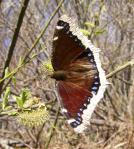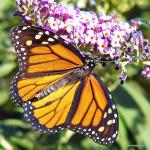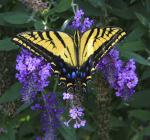-

- Mourning Cloak Butterfly (Nymphalis antiopa)
Conservation Status of Arizona Wildlife
Many species of Arizona wildlife are drifting toward extinction. Over half of the larger animals listed by the Arizona Game and Fish Department (AZGFD) are in danger, and the status of many smaller species such as the three butterflies above is uncertain.
The table shows the percent of existing native species that the AZGFD specialists consider critically imperiled (S1), imperiled (S2), and vulnerable (S3). Lacking adequate data, I did not include butterfly, moth, damselfly, and dragonfly percentages in column D, and I subtracted their numbers before calculating the total percent.
.
ARIZONA WILDLIFE CONSERVATION STATUS
A
B
C
D
E
Species Group
Total
Total minus Exotic,
Unclassified, & Extinct
AZGFD Status (S1 – S3)
(Column D÷C)
ESA Status
(LT&LE)
Amphibians
35
31
18 (58%)
2
Bats*
33
30
23 (76%)
1
Birds
551
451
260 (58%)
9
Butterflies
399
[52]
34
0
Moths
59
[5]
5
0
Damselflies & Dragonflies
137
[30]
20
0
Fish
110
40
40 (100%)
13
Lizards
69
67
27 (40%)
0
Mammals*
214
189
64 (34%)
15
Snakes
76
76
35 (46%)
1
Turtles
15
10
6 (67%)
2
TOTAL
1698
894 [981]
532 (53%)
43
*Bats are shown separately and they are included in Mammals
Conservation Status Symbol Definitions
- S1 Critically Imperiled: Extremely rare or some factor(s) is making the species especially vulnerable to extirpation. Typically five or fewer locations or very few remaining individuals (<1,000).
- S2 Imperiled: Rare or some factor(s) is making the species very vulnerable to extirpation. Typically 6 to 20 occurrences or few remaining individuals (1,000 to 3,000).
- S3 Vulnerable: Rare or found only in a restricted range (even if abundant at some locations), or because of other factors making it vulnerable to extirpation. Typically 21 to 100 occurrences or between 3,000 and 10,000 individuals.
Symbols Used for the Endangered Species Act (ESA)
- LE Listed Endangered: Imminent jeopardy of extinction.
- LT Listed Threatened: Imminent jeopardy of becoming Endangered.
Next Steps for Arizona Species Conservation
Two major problems must be solved before Arizona species will be protected. First, the people of the state do not know enough or care enough about wildlife to make an effort to protect species. Second, there is not enough information or resources to effectively protect species. The first problem must be solved before the second can be.
Public education in all possible forms is needed. One thing every interested person can do, is choose a species group and begin learning more about it. Learn to recognize species in the group, and make notes when you see them. My blog posts contain references to books and internet sites.
- Species Checklists
- Amphibians
- Ants
- Bats
- Birds
- Butterflies and Moths
- Damselflies and Dragonflies
- Fish
- Grasshoppers
- Lizards
- Mammals
- Snakes
- Turtles
Google+
 Garry Rogers
Garry Rogers




